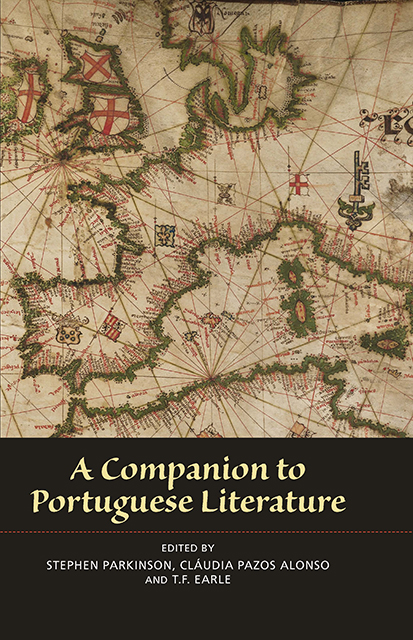Book contents
- Frontmatter
- Contents
- Acknowledgements
- Notes on the Contributors
- Introduction
- 1 Eight Centuries of Portuguese Literature: An Overview
- 2 The Medieval Galician-Portuguese Lyric
- 3 Fernão Lopes and Portuguese Prose Writing of the Middle Ages
- 4 Portuguese Theatre in the Sixteenth Century: Gil Vicente and António Ferreira
- 5 The Lusiads and the Literature of Portuguese Overseas Expansion
- 6 Lyric Poetry in the Sixteenth Century
- 7 The Seventeenth Century
- 8 The Eighteenth Century
- 9 Almeida Garrett: Founder of Modern Portuguese Literature
- 10 The Transition from Romanticism to Realism: Alexandre Herculano, Camilo Castelo Branco and Júlio Dinis
- 11 Eça de Queirós: A European Writer
- 12 Fernando Pessoa and the Modernist Generation
- 13 Narrative and Drama during the Dictatorship
- 14 Women Writers up to 1974
- 15 Writing after the Dictatorship
- 16 Portuguese Literature in English Translation
- Index
12 - Fernando Pessoa and the Modernist Generation
Published online by Cambridge University Press: 03 March 2023
- Frontmatter
- Contents
- Acknowledgements
- Notes on the Contributors
- Introduction
- 1 Eight Centuries of Portuguese Literature: An Overview
- 2 The Medieval Galician-Portuguese Lyric
- 3 Fernão Lopes and Portuguese Prose Writing of the Middle Ages
- 4 Portuguese Theatre in the Sixteenth Century: Gil Vicente and António Ferreira
- 5 The Lusiads and the Literature of Portuguese Overseas Expansion
- 6 Lyric Poetry in the Sixteenth Century
- 7 The Seventeenth Century
- 8 The Eighteenth Century
- 9 Almeida Garrett: Founder of Modern Portuguese Literature
- 10 The Transition from Romanticism to Realism: Alexandre Herculano, Camilo Castelo Branco and Júlio Dinis
- 11 Eça de Queirós: A European Writer
- 12 Fernando Pessoa and the Modernist Generation
- 13 Narrative and Drama during the Dictatorship
- 14 Women Writers up to 1974
- 15 Writing after the Dictatorship
- 16 Portuguese Literature in English Translation
- Index
Summary
When the American critic Harold Bloom included ‘the amazing Portuguese poet, Fernando Pessoa’ among his selection of the most significant writers in The Western Canon (1994), Time Magazine was wrong to consider this an example of Bloom's pandering to ‘the obligatory academic obscurity’. Pessoa is the inescapable giant of modern Portuguese letters: through his unique feature of writing different character–poets, who author separate bodies of work with distinctive styles and themes, as well as his involvement in the literary circles of the day, he almost single-handedly brought Modernism to Portugal. While some may deplore the way in which his living presence continues to overshadow every other writer in the period, and his transformation into a national icon, used and abused in contemporary culture (the so-called ‘Pessoa industry’), few would dispute the significance of his literary achievement. Bloom's championing of Pessoa's work and a recent proliferation of English anthologies has lifted him from relative obscurity in Anglophone countries to the mainstream of twentieth-century literature, placing him on a par with illustrious contemporary modernists like Ezra Pound, W. B. Yeats, T. S. Eliot and James Joyce.
Pessoa was born in Lisbon in 1888. Following the death of his father, his mother married the Portuguese consul in Durban, South Africa, and the family moved there when Pessoa was seven. He had a British education and excelled at school, immersing himself in English literature: Shakespeare, Milton, Poe, Dickens and Carlyle became firm favourites. He would have gone on to study at Cambridge but for a legal technicality to do with residency requirements, and he continued to read and write in English throughout his life. His brand of English, however, the product of a very British education in a then British colony, was always of the nineteenth-century variety: although fluent, it was old-fashioned and affected by the standards of the new century. He only became truly modern when writing in his native Portuguese.
Pessoa returned to Lisbon definitively in 1905, aged seventeen; he never again left the country, and hardly ever left the city. He mostly lived alone, was inconspicuous, and earned a modest living by writing the foreign correspondence of Portuguese companies with commercial interests abroad.
- Type
- Chapter
- Information
- A Companion to Portuguese Literature , pp. 144 - 156Publisher: Boydell & BrewerPrint publication year: 2009



